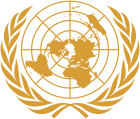The United Nations Organization
1
A century ago there was a big war. The war started in Europe. Then the war spread to other parts of the world. We call it World War One. The war went on for four years. Millions of people died. Then there was peace.
75 years ago Hitler started another war. World War Two, the largest war of them all. Even that war spread and went on for over 6 years. (Do you have a very old relative? If so, he or she may remember the war.)
2
Enough was enough! People were very tired of war. They said that countries should talk with each other instead of fighting. They created an organization (group) to prevent war.
3
The organization is called the UN.
4
"UN" is an abbreviation for the "United Nations".
5
Neither you nor I are members of the UN. Only states (countries) can be members. Nearly all the world's about 200 countries are members.
6
Sweden is one of the members.
7
Sweden supports the UN's goals.
8
Several UN leaders have come from Sweden.
| • | Jan Eliasson is currently the second most important leader (the Deputy Secretary-General). | |
| • |
Dag Hammarskjöld was the top chief, the Secretary-General, during the 1950's (and beginning of the 1960's). |
9
The goals of the UN are to solve conflicts between countries in a peaceful manner, to help poor countries, and to promote human rights.
10
In brief: peace, poverty, rights.
 12
12
The UN works like this: Every country appoints an ambassador who travels to UN headquarters in New York.
13
Each ambassador presents his/her country's position on various issues. The ambassadors from different countries communicate with each other. That is a way for them to find solutions to problems without starting a war.
14
Nearly all the countries of the world are members of the UN's General Assembly. Every country has one vote. But countries do not have an equal say.
15
It is the UN's Security Council that has the right to act to keep the peace. Their tools are: negotiations, peace-keeping forces, sanctions (for example that no one buys from a country), and military actions.
16
5 countries are permanent members of the Security Council: The USA, the UK, France, Russia, and China.
17
Those 5 counties have the largest influence at the UN.
18
They can, individually (and collectively) stop any UN decision which they don't like.
19
How can that be? The UN was established after World War II. The victorious countries were the most powerful countries of the day: the USA, the UK, and the USSR (Russia). Those countries gave themselves and their allies (friends) France and China a special sort of power in the UN. Those countries have the right to stop the UN from doing anything that they don't like, even if all the other countries disagree!
20
The right to stop is called a "veto". ("Veto" means "I forbid" in Latin.)
21
That is the way it is today as well. The same five countries have the veto in the UN. Those five countries have the right to stop the UN.
22
If those five do not agree with each other, the UN can't do anything.
23
Especially the USSR/Russia and the USA have often had difficulties coming to agreement. When the US and Russia disagree, the UN can't act.
24
When the five countries that can use the veto can't agree, the UN is paralyzed. That has happened many times. Even during the UN's childhood in the 1950's, Russia and the USA had difficulties agreeing. There was a war in Korea. (Korea shares a border with China). The USSR helped North Korea and the USA helped South Korea. The UN couldn't stop the war in Korea because the USSR (Russia) stopped all proposals which could hurt the north, and the US stopped all proposals which could hurt the south. At one point, the USSR was so unhappy that their UN-ambassador left the room. The US took the chance to get the UN's support for a war on South Korea's side. The war was terrible. The USSR never made that mistake again.
25
UN organizations help people. Some examples:
• The World Health Organization
• UNICEF (The UN's Children's Fund)
• United Nations Educational, Scientific, and Cultural Organization
26
The veto is not the only thing preventing the UN from working efficiently. The organization is short on funds but has plenty of well-paid bureaucrats who don't always do what they are supposed to.
27
Does the USA have the right to depose (get rid of) Syria's president? No. Each land is sovereign. It is not subject to any foreign power.
28
The UN is allowed to act in a country without its agreement to protect human rights and make it possible for aid to reach the needy. That is called "humanitarian intervention." (For example: Libya is 3000 km south of Sweden. In 2011 its leader killed thousands of Libyans because they wanted to have freedom. Then the UN's Security Council stopped him. Even though every country is sovereign, the UN may intervene if the UN's Security Council finds it necessary to do so.)
29
Powerful countries, right or wrong, do more or less whatever they want. That is why the UN's rules are so incredibly important for smaller countries like Sweden.
Questions
_________
More info:
·The United Nations Associations support the work of the UN, for example in the US, in Britain, & in Sweden.




